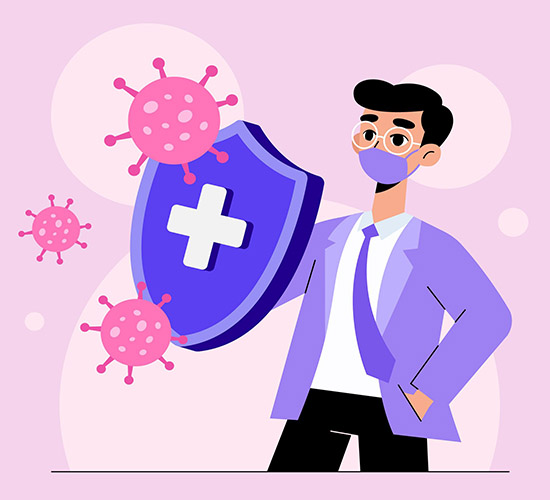Cancer Care During COVID-19 Pandemic

Authored By:
Dr Senthil J Rajappa,
Basavatarakam Indo American Cancer Hospital & RI, Banjara Hills, Hyderabad
The coronavirus pandemic has brought the world down to its knees, affecting almost all aspects of daily life. During these times, it is important that everybody takes care of themselves by practicing precautionary measures proposed by authorities. Data from multiple geographies consistently show that patients with cancer are at a higher chance of complications, including fatality, when affected by COVID 19. Therefore, it is crucial that cancer patients and survivors take extra measures to shield themselves from COVID-19. Patients and caregivers are actively encouraged to discuss various general and specific aspects of their cancer management with their physicians. This is to ensure that there is no compromise in the cancer management during COVID 19 pandemic and making sure that the risk of SARS COV 2 infection is effectively minimised [1, 2].
General Precautionary Guidelines That One Must Keep In Mind
Maintaining Social Distance: Stay at home as much as possible [3]. Maintain a distance of 2 meters or 6 feet from people when you are in public places. Wear a mask at all times when outside home.
Have Essentials Delivered: Instead of going out to buy essentials, get them delivered at home as far as possible. This reduces the chances of getting infected/being a vector.
Medications: Keep taking your medications as prescribed by your doctor. Have a backup supply of your medicines for emergency situations. [4]
Do Not Take Fever Lightly: If you feel your body temperature rising, or if you feel flushed, chill or generally unwell, check your temperature at the earliest. If it is 100.4°F or higher, call your doctor immediately.
Know The Signs And Symptoms: For people who have had chemotherapy, getting infected by the coronavirus may mean severe complications, hospitalisation, and sometimes even death. Therefore, it is important to take these symptoms seriously and notify your doctor immediately.
Stay In Touch With Your Doctor: Stay in constant contact with your doctor. Do not hesitate to call them if you feel any kind of discomfort.
Considerations For Cancer Management During COVID-19 Pandemic
During the pandemic, the priority for doctors is to reduce the time their patients spend in a hospital setting and minimise face-to-face contact with medical personnel and other patients/caregivers. In this situation, doctors tend to evaluate the urgency of the treatment and depending upon the disease and the condition of the patient. [5]. All treatments with curative intent should continue as usual. However, treatments that provide minimal benefits in terms of prolongation of life should be withheld. The risks versus benefits of continuing the cancer therapy or an alternative should be thoroughly discussed with the treating doctor. One cannot generalise these decisions and they have to be highly individualised.
Newly Diagnosed Cancer Patients:
Patients in the initial stages of diagnosis and staging for cancer need to be proactive in discussing management with their oncologist [6]. Patients with newly diagnosed cancer should proceed with the appropriate diagnostic and/or radiological tests, and with therapies without undue delay.
Patients Undergoing Cancer Treatment:
A treatment break can be considered especially in maintenance chemotherapy if your disease is in deep remission
Radiotherapy or palliative therapies for symptom relief, especially for pain, should continue. Shorter course of radiotherapy should be considered as an option
If you are taking immunotherapy, consideration for increasing the time between the treatment cycles can be beneficial
Wherever possible, changing from injectables to oral therapies can be discussed with your doctor [6]
Patients Who Are Due For Routine Follow-up:
Routine follow-up appointments may be rescheduled or postponed, in conjunction with the doctor’s recommendation. The doctors may even change the visit into a telephonic appointment, based on your condition [5]. Diagnostic tests, including scans for the recurrence of the disease could be postponed (with doctor’s advice). However, consult your doctor immediately if you develop any discomfort/new symptoms. [6]
References:
- https://www.cdc.gov/coronavirus/2019-ncov/need-extra-precautions/people-at-higher-risk.html
- https://www.cdc.gov/coronavirus/2019-ncov/prevent-getting-sick/prevention.html
- https://www.cdc.gov/cancer/survivors/staying-well-at-home.htm
- https://www.who.int/emergencies/diseases/novel-coronavirus-2019
- https://www.esmo.org/for-patients/patient-guides/cancer-care-during-the-covid-19-pandemic
- https://www.cancer.net/blog/2020-05/common-questions-about-covid-19-and-cancer-answers-patients-and-survivors